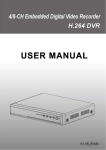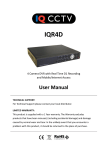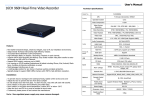Download User Manual DVR 30XX Series English
Transcript
User Manual for Embedded DVR 0 User Manual for Embedded DVR Notes: The power supply of this DVR is provided through DC12V3A adapter, please check the power outlet before installation and ensure it can meet the requirements of the adapter; Do not place the DVR at a place subject to rain and moisture; Do not install the DVR at a place subject to violent vibration; Do not install the DVR at a place subject to direct sunlight, and be far away from high temperature environment; The DVR’s back panel should be placed 15cm or more away from other objects or wall for cooling; The DVR should work under temperature, humidity and voltage according to its technical specifications; The space where DVR is installed should not be stored with corrosive chemicals that may produce volatile gases to avoid affecting the DVR’s life. The DVR should be installed in a space without much dust, and the environment should be kept clean and tidy. Proper grounding should be guaranteed during operation; The DVR should be installed to ensure proper connection with other devices. Please buy HDD from official channel to meet DVR’s long-time and large data reading and writing requirements. Statement This manual only introduces basic operation, and please refers to the E-manual in the CD for detailed operation. Please refer to the real product and this manual is just for reference. Products update without further notice. Nuances of partial functions are permitted after updating. Please contact the Customer Service Department for the latest program and supplementary instruction files. This manual is applicable to various models, and the specific operation of each product is not listed here. Users can operate the DVR based on this manual for the actual products. We have tried our best to ensure the completeness and accuracy of this manual. However, due to the unstable environment and other reasons, the real value of some data may differ. If any problem or dispute arises, the company’s final explanation will prevail. If carrying out operation not according to the instruction of this manual, the users shall bear the losses sustained. 1 User Manual for Embedded DVR Contents Chapter 1 Open-case inspection and quick installation ............................................ 3 1.1 Open-case inspection ................................................................................. 3 1.2 The Package contains the following accessories ....................................... 4 1.3 Features ..................................................................................................... 4 1.4 Product appearance and port ..................................................................... 5 1.5 Quick Installation ........................................................................................ 5 Chapter 2 Software interface basic operation ........................................................... 7 2.1 Power on and login ..................................................................................... 7 2.2 Main menu .................................................................................................. 8 2.3 Recording mode ......................................................................................... 8 2.4 Recording Search and Playback ................................................................ 9 2.4.1 Search and playback ....................................................................... 9 2.4.2 Recording backup ........................................................................... 9 2.5 Alarm Setup .............................................................................................. 10 2.5.1 Alarm basic setup .......................................................................... 10 2.5.2 E-mail alarm setup ........................................................................ 11 2.6 PTZ Control .............................................................................................. 11 2.7 Motion Detection....................................................................................... 12 2.8 Network setup .......................................................................................... 13 2.9 Port mapping ............................................................................................ 14 2.10 Mobile phone surveillance ...................................................................... 15 2.10.1 Mobile phone surveillance ........................................................... 15 2.10.2 Mobile Phone end login ............................................................... 15 2.11 Client end and playing software .............................................................. 16 2.11.1 Client end installation & running .................................................. 16 2.11.2 Player .......................................................................................... 17 2.12 IE login ................................................................................................... 17 2.12.1 Controls installation download ..................................................... 17 2.12.2 IE login ........................................................................................ 18 2.13 Central Management Software (CMS) .................................................... 19 Appendix: System Connection Picture .................................................................... 21 2 User Manual for Embedded DVR Chapter 1 Open-case inspection and quick installation 1.1 Open-case inspection ◆ When you receive the products, please check if the DVR is complete or make sure if there is any accidental damage during transportation. ◆ Then, please open the package and check if the accessories are complete. You can remove the protective film of the DVR package. 1.2 The Package contains the following accessories: ◎One IR remote controller ◎One pair of remote controller batteries ◎One piece of Product Certificate ◎One piece of product Warranty Card ◎One piece of User Manual ◎One pair SATA HDD cable ( installed in the case) ◎One DC12V3A power adapter ◎One HDD bracket (already installed) and a set of mounting screws ◎One piece of CD Specific product accessories may be different, so please refer to the real products. 3 User Manual for Embedded DVR 1.3 Features: Item Operation System Video Compression Video In Video Out Audio In Preview Alarm In Alarm Out Preview Resolution Recording Type Recording Frame Video Resolution Video Playback Video backup Video Play Motion Detection Snapshot Mail alarm PTZ Control HDD Capacity Reminder for remaining HDD recording time Internet interface and protocol IE browse DVR client CMS Dual stream Group playback Language Mobile view SDK Software update Digital enlarge USB interface Power Working temperature Working moisture degree Description Embedded LINUX H.264 4/8/16 Channel Video In (BNC Connector) 1channel BNC,1 channel VGA 4/8/2 Channel RCA Support 1/4/9/16 channel preview and sequenced play channel by channel No/No/8 channel alarm in No/No/1 channel alarm out PAL:D1(704*576),NTSC:D1(704*480) Fixed time recording,Motion detection recording PAL:25fps/channel NTSC:30fps/channel,frame is changeable 4channel full D1 realtime,8 channel at 1 channel D1 realtime ,16 channel at 16 channel CIF realtime Support local 4/8 channel playback USB,mobile HDD,Internet backup Special player software,support AVI format convertion Support Support Support alarm to appointed email Support preposition cruise,support PELCO-D,PELCO-P etc. Support 1 SATA,maximum HDD capacity is 2TB Support RJ-45 10/100M, SupportTCP/IP、DHCP、DNS、DDNS、NTP etc. Support realtime recording,video playback and backup,settings,PTZ Control Support realtime recording,video playback and backup,settings,PTZ Control Support realtime recording,video playback and backup,settings,PTZ Control Support (Main stream & Substream) Support 5 users to login the same DVR at the same time Support Chinese,English,French,Arabic,Spanish etc,15 languages. Support Windows,Symbian,Apple,Blackberry,Android etc. Support (Optional) Support software update by USB Support (by mouse) 2 DC12V/4A 0℃-50℃ 10%-90% 4 User Manual for Embedded DVR 1.4 Product appearance and port 1.4.1 Front panel Front panel 1: No. Key Function N Key Function No. Key Function o. 1 FWD Fast Forward 9 PLAY 2 REW Fast Backward 10 3 MUTE Mute 4 SEQ 5 QUAD Multi-screen Preview 6 8 Video Playback REC Recording 11 SEARCH 17 Video Search 19 PTZ 20 14 PAUSE Pause 22 MENU Menu 15 PTZ Direction 23 ESC 16 ENTER Enter 24 Key Function Sequenced Video Play 12 PTZ Escape IR Remote sensor 18 PWR Power indicator Front panel 2: No. Key Function N o. No Key Function . 1 REW Fast Backward 9 CH+ Channel Plus 17 OK OK 2 PLAY Video Play 10 Multi Multi-Screen preview 18 PWR Power Indicator 3 FWD Fast Forward 11 MENU Menu 19 LINE Internet Indicator 4 LAST Last Video 12 SEARCH Video Search 20 REC Recording Indicator 5 User Manual for Embedded DVR 5 NEXT 6 Next Video 13 MUTE Mute 21 IR Remote Sensor PAUSE Pause 14 REC Recording 22 Power Power Key 7 ESC Escape 15 PTZ PTZ 23 8 CH- Channel Minus 16 PTZ Direction 24 1.4.2 Back panel Back panel 1: Back panel 2: Back panel 3: NO. Key 1 VIDEO IN Function Video In(BNC Connector) 2 AUDIO IN Audio In 3 VIDEO OUT Video Out(BNC Connector) 4 AUDIO OUT Audio Out 5 VGA 6 NETWORK 7 RS485 To connect RS485 device like PTZ.A is positive,B is negative,G is ground. 8 ALARM Alarm out 9 DC 10 SENSOR VGA Video Out(to connect VGA device) Network interface,to connect RJ45 DC 12V(Limited load ability,can not be used for other devices) Alarm in 11 To the ground 12 Power(DC12V 4A) 6 User Manual for Embedded DVR 1.5 Quick Installation 1.5.1 HDD installation HDD must be installed by technicians to avoid damage to the equipment and hard disk. The DVR mainframe must be powered off before operation. The DVR supports HDD with SATA HDD interface. Installation procedures are as follows: A. Open the equipment and a HDD bracket can be seen; B. Connect the HDD data and power cable well; C. Put the HDD into the bracket and target the screw holes at the bracket; D. Fix the HDD on the bracket with screws, and cover the DVR. Note: The newly installed HDD can be served for video recording after formatting on the mainframe. 1.5.2 Power on Connect the DC12V3A power adapter into the power socket, and press the power button, the recorder will be on. The power indicator ―POWER‖ is on at this time, the monitor will display 4/8/16 channel monitoring image. Note: 1. If the HDD fails to be installed when DVR mainframe is power on, or the newly installed HDD fails to be formatted on the mainframe, the red ―H‖ logo will be shown in video pre-view picture. 2.The newly installed HDD cannot be used until formatted in the equipment as follows: Main Menu →HDD →HDD Format. The system will be restarted after completion of formatting. Chapter 2 Software interface basic operation 2.1 Power on and login The DVR’s initial device ID is 000000 without any password, the user can enter main menu directly. Users can set ordinary password and administrator password. The administrator has all the operating privileges, while ordinary users can only carry out monitor and video search/ playback operations. (The mainframe will match automatically when you enter password, and different permissions will be given according to different passwords). If you want to operate in main menu after the password is set, the system will display 7 User Manual for Embedded DVR ―user login‖ interface: Device ID: It is just okay to enter device ID displayed on the right side in corresponding input box. The default ID will be guided when mouse operation is done. We recommend setting a password when remote controller is operating many types of equipment, to distinguish through targeted equipment code input, or the remote controller will disturb the adjacent mainframe. 2.2 Main menu Click mouse right button after system startup, and quick operations are available to DVR system in the pop-up menu. Users can set or control parameters including main menu, key lock, video search, PTZ control and video recording. 【Playback】: Search detailed recording files 【Record】: Set the recording mode including channels, quality, frame rate, etc. 【HDD】: Check HDD capacity and formatting 【Setup】: Setup of system basic information including language, time, user password, etc. 【 Advanced 】 : Setup of alarm, motion detection, and mobile phone surveillance, etc. 【Exit】: Exit menu Note: For detailed operation, please refer to the detailed operation manual in the CD. 2.3 Recording mode The default recording mode used for the first time is the normally open and continuous video. Enter the Recording mode from ―Main menu‖—>―Record‖, as shown below: Channel: Select the corresponding video channel on or off (16ch DVR with 16 channels). Resolution: D1 (704x576), Half-D1 (704x288) and CIF (352x288), among which D1 is of the highest resolution. Quality: best, fine, and normal quality, corresponding to 3 data stream standards of highest, high and medium bit rates Frame rate: Adjust video frame rate Note: The total frame rate for 4 channels DVR is 100 fps, for 8 channels is 275 fps, and for 16 channels is 400 fps. Audio: Set the record switch. File length: There are four options -15 minutes, 30 minutes, 45 minutes and 60 minutes. REC mode: Startup recording and Timing recording When powered on: starting recording when the DVR is energized (It works only if the corresponding channel is enabled in the ―Channel‖ option.) 8 User Manual for Embedded DVR By time: performing recording as scheduled. When ―timing recording‖ is selected, the ―Record Time Configuration‖ button will appear on the right. Move the cursor here and press ―Enter‖ to enter the Record Time Configuration screen, as shown below: Channel: Select "All" or select a single channel Time configuration: Set the recording type in each time interval of each day. Red, green, and background color represent the alarm recording, regular recording, and not recording. 2.4 Recording Search and Playback 2.4.1 Search and playback Enter the Video Search screen from ―Main Menu‖ →―Video Search‖, as shown below: 1) Enter the specific date and time in the time frame and click【PLAY】, and the DVR plays back the video from the input time. 2) Enter the specific date and time, click 【SEARCH】 to display all recording status this day (the time schedule in the above picture), the red color representing alarm recording, green representing normal recording, the background representing no recording. Select the time and click 【PLAY】, playback the recording. 3) Click 【FILE LIST】, the detailed file of the video listed (as shown in the picture below), select and playback the file you want to. 2.4.2 Recording backup Enter the "file list" interface (picture below) for backup operations. The backup of recording files can be achieved through USB storage device. Before backup, the user must insert storage peripheral devices to USB2.0 slot first. Move the cursor up and down in the interface of detailed file list and select "Backup". The file is undergoing backup and the backup progress is displayed on the screen. Note: 1. When the space of the backup device is smaller than the recording file 9 User Manual for Embedded DVR capacity, the system will remind the user of insufficient space. 2. After finishing backup, exiting from the backup device directly is ok; 3. Please refer to the operation manual in the CD for network backup. 2.5 Alarm Setup Alarm port connection The input side on the back panel of DVR as Figure below, please refer to the physical interface of the faceplate: Note: The above picture is the type of normally on alarm, and normally off is the opposite way. 2.5.1 Alarm basic setup Enter from【Main Menu】→【Advanced】→【Alarm Setup】, as shown below: I/O ALARM: Each channel corresponds to an I / O alarm status, which means that alarm recording of corresponding channel will be started when one channel alarm input is valid. ON: indicating that external alarm circuit is open circuit without alarm but closed circuit with alarm. OFF: external alarm circuit that is closed circuit without alarm but open circuit with alarm. Note: When an alarm is valid, a red letter "I" will display on the corresponding screen. HDD LOSS: On: When the system cannot recognize the HDD, a red logo ―H‖ will display on the channel. HDD SPACE: On: When the remaining space of the HDD is less than 500M, the DVR will have alarm indication. VIDEO LOSS: On: When the video of a certain channel is lost, this channel will 10 User Manual for Embedded DVR display in the lower part of the Video Preview screen: ―Video Loss‖. ALARM MANAGEMENT OUTPUT: including alarm output, buzzer and post alarm recording. 2.5.2 E-mail alarm setup Email setup Prerequisite: The mainframe must be connected to the WAN. Please refer to the Chapter Network for network connection. When motion detection is triggered, the system will capture a picture at the time of triggering and send it to the corresponding mailbox. SSL: a secure link transmission protocol. ―Off‖ is usually chosen. SMTP PORT: the mailing port of the mailbox server, usually being 25, with the exception of a few mailboxes, such as the mailing port of the GMAIL server whose port number is 465. SMTP: the server address of the mailbox used, for example, the SMTP server mailing address of the 163 mailbox is smtp.163.com; please check this address from your mailbox supplier for different mailboxes. SEND EMAIL: the mailbox address used to send mails, the above-mentioned SMTP server is also the server of the corresponding sender address. SEND PW: the password of the mailbox used to send mails. RECV EMAIL: the address used to receive the picture transmitted after the DVR motion detection alarm. Please pay attention to the space of your mailbox timely lest the normal operation of the mailbox be affected due to an excess number of pictures. 2.6 PTZ Control Enter from "Main Menu" → "Advanced" to the "PTZ setup" interface, as shown below: CHANNEL: selecting the channel to which the dome camera is connected (to select any of the latter 4 channels, click ―Next Page‖) PROTOCOL: selecting the dome protocol of the corresponding brand and model, with three options, Pelco-D by default BAUD RATE: selecting the baud rate used by the dome, with the 4 options of 1200, 2400, 4800 and 9600 DATA BIT: with the options of 5, 6, 7 and 8, 8 by default 11 User Manual for Embedded DVR STOP BIT: with the options of 1 and 2, 1 by default VERIFY: with the 5 options of None/Odd/Even/Mark/Space, None by default ADDRESS: Complete the PTZ code of the corresponding channel. Just set “protocol”, “baud rate” and “address code” in order to set the PTZ. Click "PTZ control" in the main interface, the following screen will pop up (left picture): Operate the PTZ with mouse through the keypad on the interface. Set the cruise point in the cruise setup, as shown on the right picture above. 2.7 Motion Detection Enter the Motion Detection screen from ―Main Menu‖ →―Advanced‖ to ―Motion Detection‖, as shown below: STATUS: Each channel has a corresponding switch. Select ―On‖ or ―Off‖. SENSITIVITY: Each channel has a corresponding sensitivity setting, with the 4 levels of 1, 2, 3 and 4, in which 4 is the highest. Select sensitivity for confirmation. MD AREA: Each channel has a corresponding motion detection area setting. Move the cursor to ―Setup‖ of the corresponding channel, and press ―Enter‖ to enter the motion area setup screen of this channel, where a red block indicates motion detection is activated for this area and a transparent block indicates motion detection is not activated, as shown below. Motion detection setup procedures: A. Turn ―On‖ the corresponding channel in the ―Channel Switch‖ option; B. Set the sensitivity level as necessary, usually set at 3 or 4; C. Set the motion area of the corresponding channel in the ―Area Setup‖ option; D. In the ―Recording Mode‖ screen, set the corresponding channel to ―On‖ in the ―Channel‖ option; E. In the ―Recording Mode‖ screen, select ―Timing Recording‖ in the ―Recording Mode‖ option, also click ―Record Time 12 User Manual for Embedded DVR Configuration‖ to enter the Record Time Configuration screen and set the corresponding time to alarm recording (see timing recording in ―Recording Mode‖ for the setup method). After the setup has been done and motion detection is triggered, a red letter ―M‖ will appear in the screen of this channel. See ―Alarm processes‖ in Section 2.5.1 for alarm processing. Operating prompt: Remote controller operation: Use ― ― (display mode) to select full screen or blank; Mouse operation: Left-click the mouse and drag the motion box to set the area of dynamic detection. For detailed operation procedures, please refer to the manual in the CD. 2.8 Network setup Enter the ―Network‖ screen from ―Main Menu‖ →―Advanced‖ to ―Network Setup‖, as shown below: TYPE: with 4 options: STATIC, DHCP 、PPPOE and 3G. STATIC: allocating an IP address manually. DHCP: acquiring an IP address automatically (left picture below). After selecting the DHCP mode, restart the system after confirmation. After starting, the system will establish a connection with the DHCP server automatically. When this is successful, this unit will be allocated with an IP address, which will be displayed on the screen. PPPOE: broadband dial-up network access, as shown on the right picture below: 3G:3G function(support CDMA 2000 and WCDMA),select WCDMA.After success to apply, exit from 3G,and then you can see IP info . PPPOE name and password: Fill in the PPPOE user name and password provided by the Internet service provider. MEDIA PORT: the port number used in the private protocol communication between the DVR and PC, usually being 9000 by default. If this port of the PC is occupied by any other service, please modify it to another unused port. WEB PORT: the http port, usually being 80 by default. If the administrator modifies the WEB port to any other port, such as 88, you have to postfix the IP with the port number, 13 User Manual for Embedded DVR and enter ―http://192.168.1.223:88‖ in the address bar when accessing the DVR via the IE. IP ADDRESS: allocating an IP address according to the network environment of the DVR SUBNET MASK: filling in a subnet mask according to the network environment of the DVR GATEWAY: Setting the gateway according to the network environment of the DVR. If there is no router device in the network, please allocate an IP address on the same network. If there is a router device, you have to set the corresponding gateway. DNS1 and DNS2: setting the IP address of the domain name server (DNS varies from city to city); you can refer to the domain name server configurations of the PC. UPNP: When the UPNP function is on (UPNP function on the router end is also on), then the DVR will map the port and IP into the router automatically. DDNS SETUP Click ―DDNS Setup‖ to enter the screen (picture below): DDNS (Dynamic Domain Name Server): with the two options of ―ON‖ and ―OFF‖; when a dynamic domain name server is available, please select DDNS "ON"; SERVICE: The user may select his/her desired DDNS server, with the 6 options of 3322; dyndns;change ip; no-ip; leadingdvr and oray. HOST NAME: Enter the host name registered on the dynamic domain name resolution server; USERNAME: Enter the user name registered on the dynamic domain name server; PASSWORD: Enter the password registered on the dynamic domain name server. Please refer to the detailed manual in the CD for the application of domain name. 2.9 Port mapping (If the router and DVR both switch on UPNP functions, this step can be saved) Mapping steps: 1) Set the host IP address, refer to Network Setup. 2) Login the router (taking Cisco router for example). If the IP address of the router is 192.168.1.1 and after this IP has been entered in the IE address bar, a login prompt box will appear, as shown below: 14 User Manual for Embedded DVR Click OK to enter the router main interface, click the 【Applications & Gaming】as shown below: Put the DVR's IP and port (WEB port, media port, phone port) to fill in the corresponding location, the protocol is ―Both‖, and the state is ―Enable‖ or Reboot. Then click ―Save Settings‖, add other ports in the same way. 15961 is mobile phone monitoring port, this port must be added in order to use the mobile phone surveillance function. As shown above, 88,9000 and 15961 port can all be modified in the DVR main menu. 2.10 Mobile phone surveillance 2.10.1 Mobile phone surveillance The mobile phone surveillance function of this series DVR is supported by mobile phones of the Windows Mobile and Symbian operating systems. Here you can check the user name and password of the monitoring video by using the mobile phone to log in the DVR. Service port: The setting range is 1024 – 65535. This port needs to be mapped on the router, and the setting method is the same as the mapping method of network setting. User name: admin by default. Password: empty by default 2.10.2 Mobile Phone end login Taking the iPhone for example, run the iPhone’s APP Store program and search KMEye, find the installation package of application program, and click to install. Open the mobile phone software kMEye. For the first-time use, modify the 15 User Manual for Embedded DVR parameters. Click 【Settings】 to enter the parameter setting interface (left picture below), and the default port number is 15961. The user can set other port number on the DVR end. The default password is empty. Set the parameters well and connect the server, mobile phone preview interface will display (right picture below): Public IP adress or domain Default for no Note: Please refer to the Mobile Phone Surveillance Manual for detailed installation method and application instruction. 2.11 Client end and playing software 2.11.1 Client end installation & running Open client end file ― ‖ in the CD and run one of these files. After the successful installation prompts, run the desktop program (NetDvr) , it will show a login interface, as shown below: IP address: enter IP address or domain name . Media port: enter DVR media port. Password: enter DVR network password and empty by default. Network: LAN: If the computer and DVR are in the same LAN, choose ―LAN‖ mode. In this mode, the image video transmission format is CIF and frame rate is 25fps. Internet: If the computer and DVR are in different LAN, choose ―Internet‖. In this mode, the image video transmission format is CIF and the frame rate is 6fps. Language: Chinese and English are optional. 16 User Manual for Embedded DVR OFFLINE: open the attached player and play local backup video file. Note: After successful login, the interface is the same as IE end. Please refer to the manual in the CD for detailed operation. 2.11.2 Player H.264 format video compression is adopted, and a special player is needed. Open the player’s installation program ―PlaybackSetup.exe‖ in the CD. After installing successfully as prompted, run the desktop program (Playback software) and the player interface will appear: Click here Enter from ―Files‖ →‖Open local files‖, and open the contents where recording files are saved. Choose the format as .264, and select and play the recording file required, the playing recording file will display on the above screen. Corresponding playing operation and setting can be carried out. Please refer to the manual in the CD for detailed operation. 2.12 IE login 2.12.1 Controls installation download For example, if the IP address of the DVR is 192.168.1.223:88. The URL also can be Domain or the public IP address. Enter URL : http://192.168.1.223:88 17 User Manual for Embedded DVR Click“install” 2.12.2 IE login After finishing the plug-in units installation and then login. For example, the DVR’s domain name is dvrtest001.3322.org and the port is 88, enter the domain name http://dvrtest001.3322.org:88 in the IE address bar, as shown below: Password: Enter the IE password of DVR. This password is set at the Internet end. Please refer to the manual in the CD for details. Network: LAN: If the computer and DVR are in the same LAN, choose ―LAN‖ mode .In this mode, the image video transmission format is CIF and the frame rate is 25fps. Internet: If the computer and DVR are in different LAN, choose ―Internet‖. In this mode, the image video transmission format is CIF and the frame rate is 6fps. Language: Chinese and English are optional. Login: Click to login into DVR internet. Reset: Re-enter the above information. After login, the following real-time preview screen will display. Users can preview at the IE end and perform the functions of video playback, video setup, alarming setup, etc. Please refer to the manual in the CD for detailed operation. 18 User Manual for Embedded DVR 2.13 Central Management Software (CMS) This system supports connection to DVR through Internet, not through the support of intermediate server. It is convenient for user’s management. Software installation: Double click to run CD file ―DVRCMS.msi‖,finish as prompted. After successful installation, double click desktop icon and run software. Display as the following picture: 【user name】: Create the initial user name for login 【password】: Create the initial password 【Re-enter】: Confirm the initial password 【 Language 】 : Chinese and English are optional. Note: If the earlier version of this software has already been installed, please manually delete the installation menu ―user.cfg‖. The default installation menu is C:\Program Files\DVRCMS\. Please enter into the main interface of management software after successful login: 19 User Manual for Embedded DVR System configuration Lock Add DVR Del DVR DVR configuration Playback DVR list PTZ control Recording Screen split Capture Stop video Volume In the management software, there are adding device, live preview, video playback, system setup, advanced setting, PTZ control and so on. Please refer to the detailed instruction of CMS in the CD for specific operation. 20 User Manual for Embedded DVR Appendix: System Connection Picture 21 User Manual for Embedded DVR 22







































